Fun inspires work
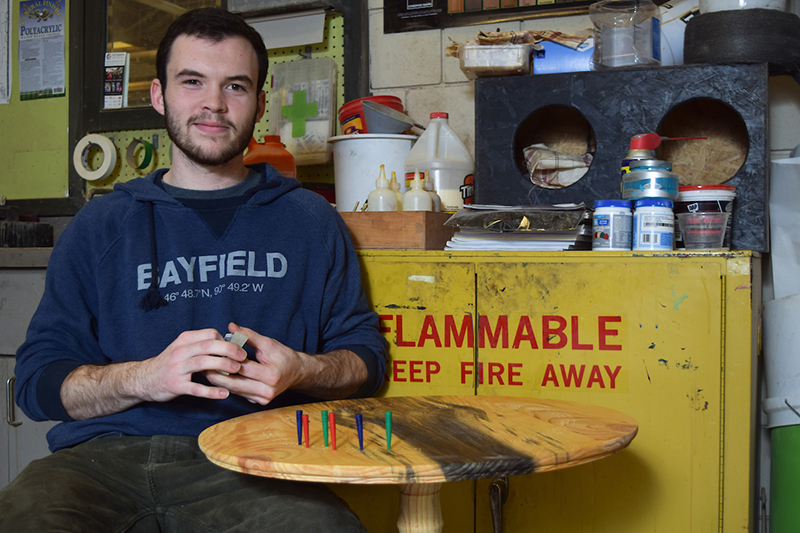
Photos by Joseph Kastner.
Walt Davis, a junior in integrated studio arts and novice cribbage player, applied his new hobby to a class assignment in the introductory furniture design course, ArtIS 320. Davis is pictured in Design's wood studio with his completed cribbage table. Below is the detail on the table top.
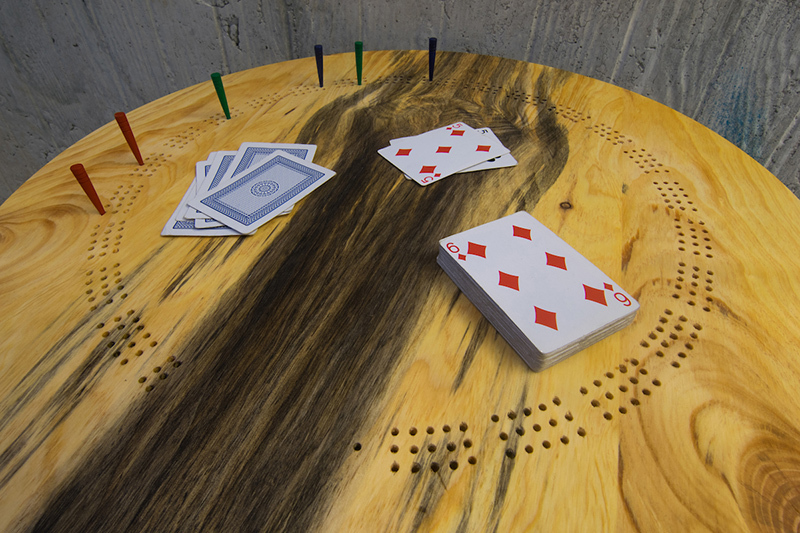
Lawrence named to extension leadership post
After a nationwide search, John Lawrence was announced March 26 as vice president of Iowa State's extension and outreach programs. He began in the role immediately.
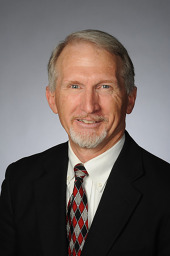
John Lawrence
"I am honored to serve my colleagues, the university, and the entire state of Iowa as the leader of Extension and Outreach,"
Lawrence said. "I look forward to working with our talented faculty, staff and partners to make a meaningful difference in the lives of Iowans."
Lawrence, interim vice president since March 2017, previously served as associate dean in the College of Agriculture and Life Sciences and an extension and outreach director.
"John has a long history of scholarship and administrative service, and is uniquely qualified to lead ISU Extension and Outreach," said President Wendy Wintersteen. "I feel confident he will work to strengthen important extension programs and partnerships and enhance the connections of our faculty, staff and students to Iowa communities."
In making the announcement, senior vice president and provost Jonathan Wickert praised Lawrence for his performance in the interim role. He thanked members of the search committee for their thoughtful consideration of candidates.
Lawrence holds a bachelor's degree in animal science and a master's degree in economics, both from Iowa State; and a Ph.D. in agricultural economics from the University of Missouri. He joined Iowa State in 1991 as an assistant professor of economics, serving as an extension livestock economist. He also has served as assistant director of the Agriculture Experiment Station and director of the Iowa Beef Center.
Lawrence also led the Iowa Nutrient Research Center, established in 2013 to develop science-based approaches for reducing the level of nutrients delivered to Iowa waterways and the Gulf of Mexico.
Eight teaching projects receive Miller grants for next year
Eight faculty teams will share $75,000 in grants next year to develop innovative approaches to undergraduate student learning. Grant funding came from the president's office ($50,000) and the Center for Excellence in Learning and Teaching ($25,000).
The CELT advisory board reviewed 29 proposals, requesting nearly $350,000 in support, and made recommendations to senior vice president and provost Jonathan Wickert, who gave final approval. The maximum grant is $15,000.
The principal investigators on the funded proposals represent five different colleges. Following is a summary of the eight proposals funded for 2018-19.
Can automated writing evaluation enhance undergraduate writing? A cross-disciplinary, multicourse pilot of Grammarly
Faculty: James Ranalli, English, and 20 collaborators
Award: $13,000
Summary: Pilot Grammarly, one of several automated writing assistant tools on the market, in writing-focused and writing-intensive courses. The team will collect student and instructor views on Grammarly's value to writing instruction.
Promoting student engagement and productive group dynamics in team-based learning calculus courses
Faculty: Amanda Baker, School of Education; and Heather Bolles, mathematics
Award: $15,000
Summary: Evaluate student engagement and team dynamics in calculus sections using team-based learning, with the goal of developing recommendations for improving student experiences and outcomes in this course -- and others that use a cooperative approach to instruction.
Sketchnoting as a pedagogical tool in ecology
Faculty: Verena Paepcke-Hjeltness, industrial design; Ann Russell, natural resource ecology and management; and Ann Gansemer-Topf, School of Education
Award: $14,148
Summary: Students who sketchnote break down complex concepts into visual combinations of words, drawings, lines and shapes. This team will introduce this note-taking strategy in an undergraduate biology course required for majors and evaluate its effect on students' capacity to solve problems.
Real talk: Engaging pre-service elementary social studies teachers in critical inquiry and conversations about race and immigration
Faculty: Noreen Naseem Rodríguez and Katy Swalwell, School of Education
Award: $10,751
Summary: Students in required early childhood and elementary methods courses will work in small reading groups to study race and immigration in the U.S. to be better prepared to work with children whose race and linguistics are different from their own.
Latino/as and the Iowa immigration experience: Undergraduates and community engagement
Faculty: Megan Jeanette Myers and Flor Romero de Slowing, world languages and cultures
Award: $7,091
Summary: In this new course, undergraduates majoring or minoring in Spanish or U.S. Latino/a studies will serve as mentors to Perry High School students to improve their own cultural competency, social responsibility, and leadership and communication skills.
Practical experience on service dog behavior and training science
Faculty: Mariana Rossoni Serao and Jodi Sterle, animal science
Award: $5,000
Summary: Provide 10 weeks of service dog training (who serve individuals with disabilities) to undergraduate students, who will teach senior animal science students. The end goal is to alert students to the career and help meet the high demand for professionals in this field.
Developing innovative and interactive digital learning resources for veterinary medical students: Canine and feline applied anatomy
Faculty: Thimmasettappa Thippeswamy, biomedical sciences; Jessica Ward, veterinary clinical sciences; Jared Danielson, College of Veterinary Medicine dean's office; and Cory Farver, College of Veterinary Medicine IT services
Award: $5,000
Summary: Create digital, interactive resources for veterinary anatomy (regarded as a difficult and important yet dull subject) to improve students' motivation and enthusiasm for studying it.
Identifying factors that aid in the successful transition of transfer students from a two-year institution to Iowa State University
Faculty: Jennifer Bundy, animal science
Award: $5,000
Summary: Using several methods, collect qualitative and quantitative feedback from this specific group of transfer students to get at why their retention and graduation rates are lower than direct-from-high-school students and where resources are lacking that could help improve the rates.
The projects must be completed by June 30, 2019. In addition to preparing a final report, Miller fellows share the outcomes of their project during a fall luncheon.
The 2018-19 academic year will be the 22nd year of the Miller Faculty Fellowship program. It is named for and partially funded by the estate of F. Wendell Miller, an attorney and farm manager who died in 1995. His will stipulated that the bulk of his estate be used to create the Miller Endowment Trust, with income from the trust divided equally between Iowa State and the University of Iowa. Former president Martin Jischke established the faculty fellowship program in 1996.
Library collection aims to recognize influential black scholars
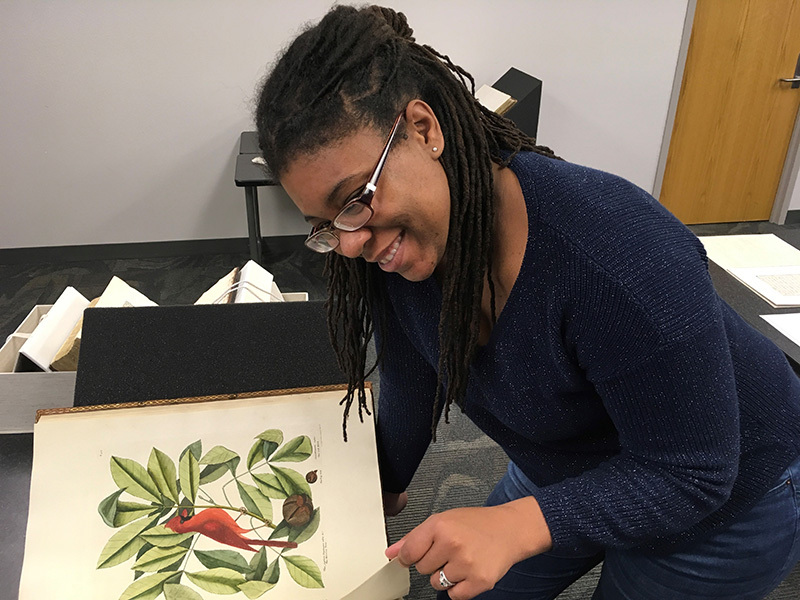
Shaina Destine, a resident librarian/archivist, has created a collection of biographical information about Iowa State graduates from 1900 to 1950 who later had prominent careers at historically black colleges and universities. Submitted photo
When Shaina Destine arrived at Iowa State last June, she noticed it in her first day of work at Parks Library. The library's archives had no central collection of information about the university's earliest black scholars. She's been working to create one ever since.
"It was shocking to me that no one had ever thought of that before me," said Destine, a resident librarian/archivist on a three-year term as part of Iowa State's participation in the Association of College and Research Libraries' diversity alliance.
Though Destine has long loved history, that appreciation is complicated by her recognition that those who are treated and remembered as historical figures rarely look like her.
"People who don't have that same concern don't really realize how hard that is," she said.
Scouring sources
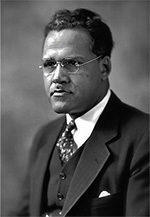
Frederick Patterson

Cecile Edwards
Over the past eight months, she's been collecting biographical information about black Iowa State graduates from 1900 to 1950 who went on to prominent careers at historically black colleges and universities (HBCU). In her presentation about the project at the Iowa State Conference on Race and Ethnicity (ISCORE) earlier this month, Destine shared information about 28 Iowa State graduates she has identified, a list that will grow as she continues to receive tips and suggestions.
After earning Iowa State degrees, these pioneering academics cut impressive paths. Frederick D. Patterson (doctorate in veterinary medicine, 1923) founded the United Negro College Fund. Samuel Massie Jr. (doctorate in organic chemistry, 1946) worked on the Manhattan Project at the Ames Laboratory and was the first black professor at the U.S. Naval Academy. Cecile Edwards (doctorate in foods and nutrition, 1950) was a renowned nutrition expert who authored over 160 papers and served as dean of three separate schools at Howard University.
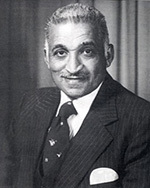
Samuel Massie Jr.
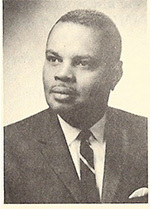
Benjamin Perry Jr.
Many went on to be leaders -- often the founders -- of HBCU programs and colleges. Five served as president: Patterson at Tuskegee Institute (now Tuskegee University), Massie at North Carolina College, Durham (now North Carolina Central University), Edward Evans Sr. at Prairie View Normal and Industrial College (now Prairie View A&M University), Rufus Atwood at Prairie View A&M and Kentucky State Industrial College for Colored Persons (now Kentucky State University) and Benjamin Perry Jr. at Florida A&M University.
Though they were all influential scholars, tracking down specifics about their lives often is challenging. Black students, for instance, typically were excluded from potential historical resources such as yearbooks, Destine said. She's worked closely with archivists from many HBCUs and
scoured through scattered sources such as dissertations and obituaries. The information she draws upon often is relayed from a point of view that whitewashed the racism these scholars faced, Destine said.
"A lot of it is reading between the lines," she said.
Hopes for future
Destine hopes to use the collection, available in bare form as her presentation slides in the library's digital repository, to create an easy-to-navigate website that makes the information more accessible. Ideally, the collection's framework would be fleshed out with archival material and additional entries over time, making it an archive that "lives and breathes and continues on after I leave here." She'd also like to see a similar collection of historical information about graduates from other underrepresented and marginalized populations.
Expanding and improving the collection could be a valuable subject for student coursework in the future or lead to highlighting overlooked black scholars more publicly, attendees suggested during Destine's ISCORE presentation.
"I think it could turn into something big," Petrina Jackson, head of special collections and university archives, said during the March 2 presentation.
Review, update your ISU Alert notification options now
Iowa State's Critical Incident Readiness Team (CIRT) will test ISU Alert during the first week of April. The emergency notification system alerts students, faculty and staff to potentially dangerous situations by phone, email and text message.
In anticipation of the test, CIRT chair Vernon Hurte, associate vice president for student affairs and dean of students, encourages all university community members to review and update their ISU Alert notification options in AccessPlus. This is important because:
- Employee notification for text messages is left blank unless an individual designates a phone number for that option. Voice and email options are automatically filled in with employees' office numbers and email addresses.
- The same is true for students' text message alerts. That field is left blank until they designate a phone number for the text option. Additionally, voice notification defaults to the phone number on record. If a student has not updated that number since enrolling, in many cases the emergency message may go to a parent phone or a permanent home number, which doesn't reach the student directly. The email field is automatically populated with each student's @iastate.edu address.
"We want to know how you can most quickly and likely be reached," Hurte said. "The contact information you share isn't used beyond ISU Alert."
New partner: Rave Mobile Safety
ISU Alerts have been sent to the university community more than three dozen times since the emergency message service began in 2007 -- including all tests, critical incidents, weather-related alerts and all-clear messages.
This spring, Iowa State transitioned from Blackboard Connect to a new vendor, Massachusetts-based Rave Mobile Safety, to power ISU Alert. Iowa State is among 500 U.S. campuses, including the University of Iowa, to implement Rave. Dispatchers in the department of public safety will be responsible for sending emergency messages, and they have been testing the new system weekly with a sample group since October. April's campuswide ISU Alert test will be the first under the new vendor.
What you'll see
- SMS text messages: Text messages will come from either 67283 or 226787, according to Michael Newton, assistant vice president and chief of ISU Police. He encouraged employees and students to save these numbers in their phones so they recognize them when receiving future messages. If a mobile carrier or wireless plan doesn't support these short codes, the alert message would come from @getrave.com, he said.
- Email: Emergency notifications will come from isualerts@iastate.edu
What's ahead
Newton said faculty, staff and students who received ISU Alert messages under the previous infrastructure (Blackboard Connect) probably won't notice much difference under Rave -- yet. But the new system -- Rave Guardian -- includes options campus leaders plan to review and may integrate in the coming weeks and months. These include a mobile app that turns any smartphone into a personal safety device, the ability to dial 911 at the touch of a button and other enhancements. Newton said these features have been implemented at other institutions and could provide "increased capability and capacity."
"We also will look toward more integration with social media and links to digital signage," he said.
Other emergency measures
ISU Alert is just one way to deliver critical emergency information to students, faculty and staff. Updates also are provided on the university homepage and through official social media platforms (Twitter, for example: @ISUPD, @IowaStateU and @IowaStateUNews). There also are warning sirens, public address announcements and other means already in place.
"As always, when you receive an alert, please follow the direction given," Newton said. "And if you're at the scene of an emergency, remain calm and follow instructions from police. It takes all of us to make sure we have a safe and secure campus."
Questions about ISU Alert may be directed to dpsinfo@iastate.edu or Heather Forburger, DPS administrative specialist, 294-3116.
New websites focus on IT security and service
If your office phone isn't working, a campus website won't load or internet connectivity seems slow, a new website can shed some light on the problem ... if there is one.
The status page is one of two new sites and a fresh look for the information technology pages launched this month by IT:
- The new system status webpage displays the current performance of IT services and networks, with a log of recent service interruptions and planned maintenance. Users can report issues or get help through the Solution Center.
- IT's new security website provides a form to report suspected threats and security incidents. Alerts, support and resources -- such as email "phishing" scams or security tips -- also are available through the site.
'Oklahoma!' opens April 5
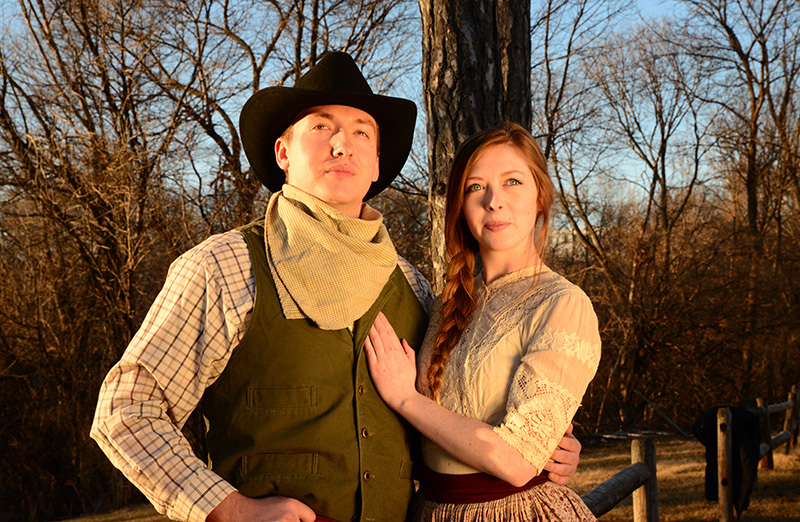
From left to right, seniors Michael Madison and Morgan Darrow portray the title roles of Curly and Laurey in a production of the Rodgers and Hammerstein classic musical, "Oklahoma!" Photo by James Tener.
Seventy-five years after its Broadway debut, "Oklahoma!" takes the Fisher Theater stage for ISU Theatre's annual collaboration with the music department. The musical was the first of many classic hits written by Richard Rodgers and Oscar Hammerstein.
The two-act production features an extensive cast of actors, singers, dancers and musicians. Brad Dell, associate professor of theatre and the show's director, said about 70 students involved in the shows, with 30 to 40 more who worked on sets and costumes.
"It's really an incredible student footprint involved in this production. Majors from all over the university are involved," Dell said. "Doing a show like this really does become a mountain-top experience for so many of the students during their time here at Iowa State."
In the musical's story, love ups the ante in the rivalry between farmers and cowboys living in 1906 Oklahoma. Although secretly in love with a cowboy named Curly (senior Michael Madison), Laurey (senior Morgan Darrow) fears the realization of an ominous dream if she reneges on plans to attend a town social with Jud (senior Nolan Brown), the farmhand.
Meanwhile, Will (sophomore Lincoln Klopfenstein) returns to town with his steer-roping winnings and plans to marry Ado Annie (senior Angelica Elkema). Unfortunately, the charm of traveling salesman Ali Hakim (senior Christopher Culver) has caught the interest of both Ado Annie and her father, Judge Carnes (senior Andrew Kille Smith).
Dell said some aspects of this production were influenced by current social and political events. Pointing to its representation of the "American spirit" during World War II, he said "Oklahoma!" could inspire audiences in new ways today.
"In light of all the political unrest and squabbling in every direction, how can we be like the characters in this play and work as a community to make the world a better place -- which is what I think is ultimately happening in this show, " Dell said.
"Probably the main reason Oklahoma! was so popular at the time is that it is so hugely and wildly entertaining. I think this production certainly is, as well," Dell said. "But I hope it also becomes a production that is inspiring and thought-provoking."
"Oklahoma!" opens its four-date run on Thursday, April 5. Show times are 7:30 p.m. April 5-7, and 2 p.m. on Sunday, April 8. Tickets are $25 ($16 for students), available through Ticketmaster and the Stephens ticket office. Dell said limited seating remains, but tickets still are available for each show.
